What happens if you take EllaOne® on your period?
When it comes to the morning after pill, we know you may have a lot of questions. How does emergency contraception work? How effective is the morning after pill? And, perhaps, what happens if you take emergency contraception on your period?
Before delving into this question, let’s take a brief look at the menstrual cycle and how it works.
How the menstrual cycle works
The menstrual cycle begins on the first day of your period and lasts until the day before your next period. Everyone is different, and the length of the average menstrual cycle can range from 21 to 40 days. You may also find that your cycle changes from month to month, and your period may arrive a few days earlier or later than expected at times.
Your menstrual cycle is broken up into different stages. These are:
-
- Menstrual phase
- Follicular phase
- Ovulation phase
- Luteal phase
Ovulation is where a mature egg is released from the ovary, travels down the fallopian tube and stays there for between 12 to 24 hours. If you have unprotected sex during this time – or if you’ve had unprotected sex in the last five days (the amount of time sperm can survive in the body) – the egg may fuse with a sperm to form one cell, which then heads to the uterus. It may then implant on the uterine wall and release pregnancy hormones. Pregnancy begins when implantation begins – not before.
Whilst ovulation typically happens on day 14 of your cycle, it can vary from person to person – and from cycle to cycle. It’s really hard to pinpoint the exact moment of ovulation because various factors like your sleep schedule, exercise, stress, diet, health conditions and contraception can all have an effect on your menstrual cycle.
Can you get pregnant on your period?
You can’t get pregnant on your period, right? Unfortunately, it’s not as simple as that. If you have a short menstrual cycle, you could ovulate soon after your period ends, which means your fertile window may happen sooner than you’d expect. If you’ve had unprotected sex during or soon after your period and you ovulate whilst the sperm is still in the body, there is a chance you could become pregnant.
Can you take EllaOne® on your period?
“It is recommended that emergency contraception should be taken as soon as possible after unprotected intercourse, and within the recommended time,” says Dr Hana Patel*, an NHS GP. “This maximises the effectiveness of the medication. You can take emergency contraceptive pills anytime during your menstrual cycle.”
If you’ve had unprotected sex and you want to help prevent unplanned pregnancy, you may want to take the morning after pill. You can take the morning after pill on any day of your cycle. When accessing the morning after pill, your pharmacist or GP may ask you some questions about your menstrual cycle, as well as about any medications you are taking, to determine what the best option for you would be.
ellaOne® is the most effective* morning after pill and is 2.5x more effective than morning after pills containing levonorgestrel when taken within 24 hours of unprotected sex. You can buy ellaOne® from a pharmacy or online via ellaOne Direct. Find out more about ellaOne®.
Does the morning after pill affect your period?
So can ellaOne® affect your cycle? “Some women may find that their period may last longer than usual after taking emergency contraception,” says Dr Hana Patel. “Some women experience a lighter or heavier flow during their first period after the morning after pill, but it is more common to experience a heavier bleed than lighter. If your period is a week later than usual or still hasn’t started within 3 weeks of taking the morning after pill, there may be a possibility that you could be pregnant and I’d advise that you carry out a pregnancy test and seek medical advice.”
As the morning after pill delays ovulation, some people may find that their period is a few days later than usual after taking it. Emergency hormonal contraception won’t always delay your period, however, and it may come right on time or even be early! The effect that the morning after pill has on your period will be different for different people, and so whilst some may feel that it ‘brings on’ their period, others may find that their period is delayed or that there is no effect on their period.
If your period is later than seven days, or if you have any concerns about pregnancy, we recommend that you take a pregnancy test and speak to a doctor for advice.
Remember that taking the morning after pill is a responsible choice that is your right to make for your body. Accidents can happen to anyone and sometimes people just get caught up in the moment. If you don’t want to have a baby now or ever then you have every right to help prevent unplanned pregnancy. We know that some people may feel anxious or embarrassed about taking the morning after pill, so if you’ve ever taken emergency hormonal contraception why not share your story below to help reassure other women and people with uteruses?
*Dr Hana Patel does not endorse any products or brands.
ellaOne® 30mg film-coated tablet contains ulipristal acetate and is indicated for emergency contraception within 120 hours (5 days) of unprotected sexual intercourse or contraceptive failure.




